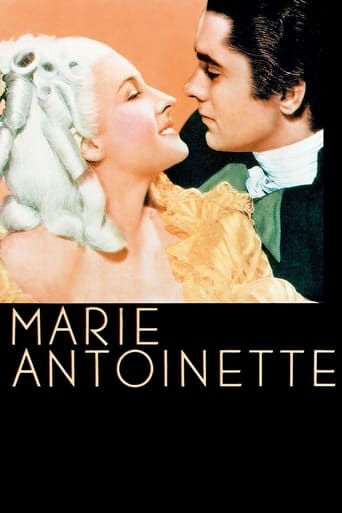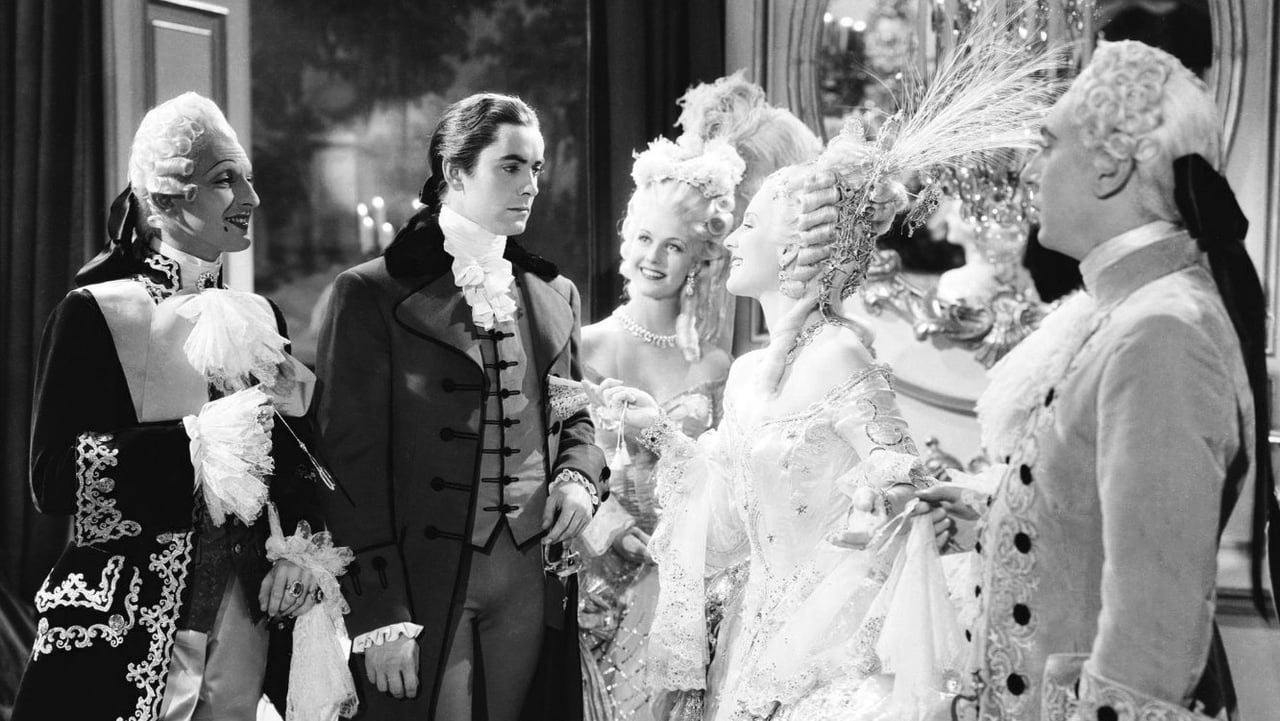calvinnme
If there's only one performance in Norma Shearer's career that should be seen, for my money it's in the title role of Marie Antoinette, MGM's extraordinarily lavish costume depiction of the legendary figure of French history.The film is a model of the studio system when it spared no expense, with breath taking costumes and sets. Yes, the film goes on too long and not all of its performances are a success. For example, Tyrone Power has a particularly weakly written character to play, one actually based on history, but, for the most part, this films works.Norma is very impressive in her early scenes as a young innocent arriving at the French court, expecting her yet unseen betrothed to be a prince charming but getting, at first glance, and at first conversation for that matter, a frog. She gradually learns the ways and politics of the court of France and experiences a gradual conversion over to a life of frivolity.But Shearer's finest moments in the film are those that depict her character's downfall with the French Revolution. Shearer plays the scenes with a dignity and strength of character that are impressive before, inevitably, her character starts to break down under the strain.The most heart breaking scene in the film is the scene in the prison cell in which members of the Revolution suddenly appear to take the former queen's children away from her. Shearer is no longer a proud queen as she plays a woman who will fight like a wildcat to keep her children with her.Having said all this about Shearer, I think that the most memorable performance in the film comes from Robert Morley as Louis XVI, a simple minded man derided by aristocratic members of the French court, but, in the final analysis, a good man who displays dignity and courage when he faces the end.
MissSimonetta
Norma Shearer was at her best during the silent era and the pre-code period between 1929 and 1934. Once the Hays Code rolled in, she was stuck with what have been described as "queenly roles" in rather stuffy period pictures like Romeo and Juliet (1936) and this film, Marie Antoinette (1938). Despite its reputation, this is not a bad movie, just a rather standard Hollywood biopic.Shearer does well as the queen and undergoes the transformation from innocent teenage bride to weary tragic queen beautifully. Tyrone Power is handsome and solid, but doesn't get to do much as the queen's lover. The rest of the cast is good, but not exceptional.The sets and costumes are breathtaking. It's a shame this was not filmed in Technicolor as was planned. The ornate settings beg for it.All in all, not bad, but nothing special.
g_dekok
I have always found Ms. Shearer to be a much finer actress than joan crawford. Crawford was an OK actress, but Norma was obviously better. In her myriad of roles from "Marie Antoinette" to Mary in "The Women", it simply shows.Crawford grew desperate for good roles in her later years, and it was only through the pity shown her by the studios that she got any job at all. Her role in "The Women" showed her as she truly was, pitiful, grasping at straws, desperate in her life.I believe it was Bette Davis who remarked that "of course she was popular in Hollywood. She slept with every male except Lassie!"
Robert J. Maxwell
One hundred and fifty-seven minutes of lavish romance, intrigue, and politics, dished up by MGM's superb spectacle factory. There's an "entre act" and everything.The problem, for me anyway, is that the thing is so exquisitely dull. The first half -- before the entre act, that is -- is a kind of late 18th-century soap opera. Norma Shearer is the young Austrian bride of the future king of France, Louis XVI, played by Robert Morley as impotent and inept but not unkind. When Shearer learns of this arranged marriage, she positively kvells. "Oh, just think of it! I'll be the Queen of France!" Things don't turn out all that well for her, though. (Do they ever, in these genre movies?) She's resented as a foreigner and barbarian at the French court, especially by the waspish Madame DuBarry, the consort of Morley's grandfather, the current king. Such gossip you never heard. And then there's Morley's apparent indifference to her. ("I like to be alone.") What's a girl to do? She drowns her sorrows in wine and flings with lovers in seriatim. This is nice work, if you can get it. You get to indulge yourself in every sensory modality known to man or beast -- AND you get the sympathy of the audience too, because they know you're just being flighty out of a desperate loneliness.The second half turns a little darker, but then, as they say, it's always darkest just before it turns completely black. By this time Morley has come around enough to give Shearer two children, from whom she is of course eventually separated, giving the audience a reason for still more tears. Let's see. I checked the spoiler box so I guess I can give away the ending: Marie Antoinette gets her head lopped off.Kids, I hope I didn't ruin it for you but, see, this is the French Revolution and revolutionaries tend not to be very kind. All through history, it seems that some merciless dictator, like a king, mistreats his subjects until they depose him. Then they show that, unlike him, they are full of New-Testatment-mercy by slaughtering the deposed ruler, his family, and anybody who was ever associated with him. (Fidel Castro worked his way down to mailmen.) At that, the peasants are treated in this movie with the contempt the writers think they deserve. What an uncouth bunch! Shearer explains the unrest to her children this way: We didn't do anything, but they're ignorant and unhappy and must take it out on somebody. In this movie, nobody ever says "Let 'em eat cake." Most of the cast overact, but this is understandable because it's common to the period. I don't know what "charisma" is supposed to mean these days. It was originally used to describe the quality of someone who was blessed by God and exuded a magnetism that was religious in its properties. Now, the word is slung around loosely to describe rock stars. Whatever it is, and however it's measured, I don't think Norma Shearer has any. Joseph Schildkraut, effete and painted like a mannequin, gives the best performance. Robert Morley seems to have only one note on his instrument. In a relatively minor role as Shearer's one true love, Tyrone Power has a part that is familiar to devotees of these kinds of movies. The woman is haunted by demons, surrounded by knaves, impostors, ninnies, and exploiters -- and this is the only man who will return from time to time to rescue her from some folly or to reassure her with his understanding and candor. (Cf., Paul Newman in "I'll Cry Tomorrow" or Sam Shepherd in "Frances".) This must have been an eye opener in 1938. Today it seems stale and bound by conventions common to genre films. Anyone who wants a more balanced and adult point of view should see Ronald Coleman in "A Tale of Two Cities." It would be a far, far better thing to do. It will jerk almost as many tears but it will challenge you too.



 AD
AD



